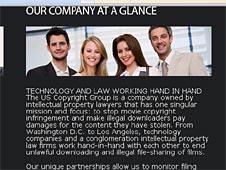US pirate hunters target movies
- Published

Oscar winning film The Hurt Locker is among the films being targeted
An organisation set up in the US to track down and punish illegal file-sharers is coming under increasing scrutiny from civil liberty groups.
The US Copyright Group (USCG) has been working on behalf of a range of movie makers, most notably those behind box office hit The Hurt Locker.
It has pledged to target 150,000 illegal downloaders in coming months.
But civil rights groups have questioned its motives.
Legitimate defences
On its website USCG offers to help film industry leaders, producers and copyright owners to recover losses due to illegal downloading.
It promises to assist with halting copyright infringement which is a huge problem for the movie industry.

USCG's website promises to help recover piracy losses
"You are about to join fellow film industry leaders, producers and copyright owners in recovering reasonable cash settlements from the unlawful downloading of your copyright film," the website reads.
But civil rights group the Electronic Frontier Foundation is not convinced the fight against piracy is its prime motivation.
"The USCG attorneys bringing these suits are not affiliated with any major entertainment companies, but are instead intent on building a lucrative business model from collecting settlements from the largest possible set of individual defendants," said a spokeswoman for the body.
"We've long been concerned that some attorneys would attempt to create a business by cutting corners in mass copyright lawsuits against fans, shaking settlements out of people who aren't in a position to raise legitimate defences," it added.
The cases that have gone to court appear to be following this pattern. USCG recently filed seven cases in Washington, with thousands of alleged pirates targeted in each case.
However few of the defendants actually live in the District of Columbia.
It would mean defendants would have to pay out for travel costs as well as legal expenses to fight a case.
USCG acknowledged on its website that many people will not have the financial clout to pursue cases.
"As a practical matter each individual infringer lacks the assets, net worth and earning capacity to make civil prosecution practical," it said.
EFF alongside ACLU has asked the judges in the cases to cancel court summons against those accused.
Judges involved in the case have asked USCG to explain why it has brought together so many people together in one lawsuit.
It has until 30 June to explain why it is pursuing cases in this manner.
Threatening customers
Civil liberties organisations say the lawsuits are fundamentally unfair because innocent people can be wrongly accused. The methods used by the firm find only the address of the computer rather than the individual responsible.
So far USCG has obtained the IP addresses of some 20,000 users and has pledged to target around 130,000 more.
It uses a German technology firm to identify illegal file-sharing activity and once it has the IP address it can then apply to the courts to get the physical address of the person, alleged to own the connection, from the relevant internet service provider.
It echoes a similar practice in the UK, where law firm ACS:Law has been sending letters to thousands of alleged file-sharers, asking for a settlement payment of about £500 per infringement.
UK ISP 02 has accused ACS: Law of "bullying and threatening" its customers and its practises have been questioned in the House of Lords.
The UK music industry has distanced itself from the methods used by the law firm.
It is currently the subject of an investigation by the UK's Solicitors Regulation Authority, while consumer watchdog Which has been compiling a dossier of those it says have been wrongly accused.
"The approach we use is the only proven effective proceeding," the firm has previously told the BBC.
"With the infinite number of products offered on file-sharing networks, no other process would even be possible, this is just another example of the astronomical dimensions that file-sharing has taken on."
The BBC contacted the USCG and lawyers at the Washington-based law firm Dunlap, Grubb & Weaver - which is the lead firm in all the actions.
There was no response to e-mails sent to the USCG and lawyers from Dunlap, Grubb & Weaver also refused to comment.
- Published2 June 2010